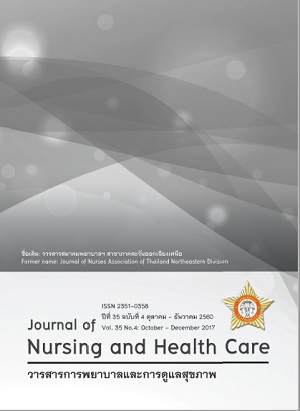อิทธิพลของพื้นอารมณ์ที่มีต่อพฤติกรรมการรับประทานอาหารในเด็กวัยเรียน Influencing of Temperament on Eating Behaviors in School-age Children
คำสำคัญ:
พื้นอารมณ์เด็กวัยเรียน พฤติกรรมการรับประทานอาหาร การกินน้อยลงตามอารมณ์ ความช้าในการกิน การตอบสนองต่ออาหารที่ไม่คุ้นเคย, school-age children temperament eating behaviors emotional under-eating slowness eating food fuzzinessบทคัดย่อ
เด็กวัยเรียนเป็นวัยที่การมีพัฒนาการทางร่างกายและสติปัญญาในระดับที่สามารถดูแลตัวเอง คิดตัดสินใจเลือกซื้อ และเลือกรับประทานอาหารได้เอง การวิจัยเชิงทำนายครั้งนี้มีวัตถุประสงค์เพื่อศึกษาอิทธิพลของพื้นอารมณ์ที่มีต่อพฤติกรรมการรับประทานอาหารในเด็กวัยเรียน กลุ่มตัวอย่างคัดเลือกโดยใช้การสุ่มตัวอย่างแบบกลุ่มจากเด็กนักเรียนที่กำลังศึกษาอยู่ในชั้นประถมศึกษาชั้นปีที่ 4-6 ในโรงเรียนระดับประถมศึกษาแห่งหนึ่ง จังหวัดชลบุรี จำนวน 90 ราย เครื่องมือที่ใช้ในการวิจัย ประกอบด้วย แบบสอบถามข้อมูลทั่วไป แบบสอบถามพื้นอารมณ์ของเด็กวัยเรียน-สำหรับครู และแบบสอบถามพฤติกรรมการรับประทานอาหารในเด็ก วิเคราะห์ข้อมูลด้วยสถิติพรรณนา และการวิเคราะห์ถดถอยพหุคูณแบบขั้นตอน ผลการวิจัยพบว่า พื้นอารมณ์แบบการแสดงปฏิกิริยาทางลบสามารถทำนายลักษณะการกินน้อยลงตามอารมณ์ได้ร้อยละ 6.0 (β = .25) การถอยหนีสามารถทำนายลักษณะความช้าในการกินได้ร้อยละ 11.1 (β = .33) การติดตามงานและกิจกรรมทางกาย สามารถร่วมกันทำนายลักษณะการตอบสนองต่ออาหารที่ไม่คุ้นเคยได้ร้อยละ 15.7 (β = -.44 และ β = -.37 ตามลำดับ) ผลการวิจัยนี้ให้ข้อเสนอแนะว่า พยาบาล และบุคลากรที่เกี่ยวข้องสามารถนำผลการวิจัยนี้ไปใช้เพื่อทำความเข้าใจพื้นอารมณ์ของเด็กวัยเรียนและพัฒนาโปรแกรมส่งเสริมพฤติกรรมการรับประทานอาหารที่เหมาะสมต่อไป
School-age children are the age of a heightened physical and intellectual development. They can take care of themselves for buying decision of eating. This predictive study aimed to determine the relationship and influencing of temperament on eating behavior in school-age children. The cluster sampling consisted of 90 children of grade 4-6 at elementary school, Muang district, Chon Buri province. Research instruments included a demographic questionnaire, the school-age temperament inventory-teacher version, and the child eating behavior questionnaire. Data were analyzed by using descriptive statistics and Stepwise multiple regression analysis. The results showed that the temperament of negative reactivity accounted for 6.0% (β = .25) in the prediction of emotional under-eating. Withdrawal accounted for 11.1% (β = .33) in the prediction of slowness eating. Task persistence and physical activity together accounted for 15.7% (β = -.44 and β = -.37, respectively) in the prediction of food fuzziness. These findings suggest that nurses and related personnel could apply to use for understanding the temperament of school-age children. In addition, an intervention program to promote appropriated eating behavior would be further implemented.



